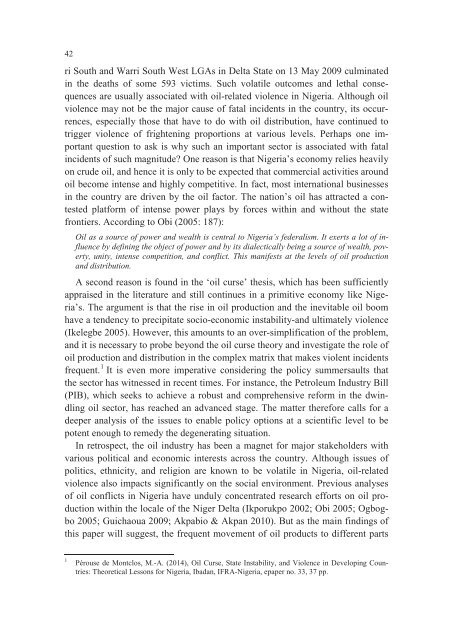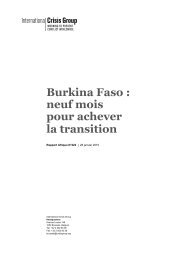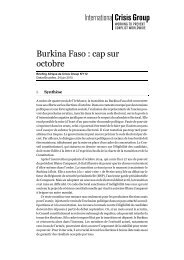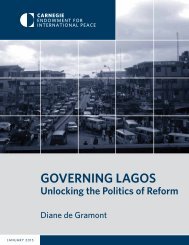Violence in Nigeria
ASC-075287668-3743-01
ASC-075287668-3743-01
Create successful ePaper yourself
Turn your PDF publications into a flip-book with our unique Google optimized e-Paper software.
42<br />
ri South and Warri South West LGAs <strong>in</strong> Delta State on 13 May 2009 culm<strong>in</strong>ated<br />
<strong>in</strong> the deaths of some 593 victims. Such volatile outcomes and lethal consequences<br />
are usually associated with oil-related violence <strong>in</strong> <strong>Nigeria</strong>. Although oil<br />
violence may not be the major cause of fatal <strong>in</strong>cidents <strong>in</strong> the country, its occurrences,<br />
especially those that have to do with oil distribution, have cont<strong>in</strong>ued to<br />
trigger violence of frighten<strong>in</strong>g proportions at various levels. Perhaps one important<br />
question to ask is why such an important sector is associated with fatal<br />
<strong>in</strong>cidents of such magnitude? One reason is that <strong>Nigeria</strong>’s economy relies heavily<br />
on crude oil, and hence it is only to be expected that commercial activities around<br />
oil become <strong>in</strong>tense and highly competitive. In fact, most <strong>in</strong>ternational bus<strong>in</strong>esses<br />
<strong>in</strong> the country are driven by the oil factor. The nation’s oil has attracted a contested<br />
platform of <strong>in</strong>tense power plays by forces with<strong>in</strong> and without the state<br />
frontiers. Accord<strong>in</strong>g to Obi (2005: 187):<br />
Oil as a source of power and wealth is central to <strong>Nigeria</strong>’s federalism. It exerts a lot of <strong>in</strong>fluence<br />
by def<strong>in</strong><strong>in</strong>g the object of power and by its dialectically be<strong>in</strong>g a source of wealth, poverty,<br />
unity, <strong>in</strong>tense competition, and conflict. This manifests at the levels of oil production<br />
and distribution.<br />
A second reason is found <strong>in</strong> the ‘oil curse’ thesis, which has been sufficiently<br />
appraised <strong>in</strong> the literature and still cont<strong>in</strong>ues <strong>in</strong> a primitive economy like <strong>Nigeria</strong>’s.<br />
The argument is that the rise <strong>in</strong> oil production and the <strong>in</strong>evitable oil boom<br />
have a tendency to precipitate socio-economic <strong>in</strong>stability-and ultimately violence<br />
(Ikelegbe 2005). However, this amounts to an over-simplification of the problem,<br />
and it is necessary to probe beyond the oil curse theory and <strong>in</strong>vestigate the role of<br />
oil production and distribution <strong>in</strong> the complex matrix that makes violent <strong>in</strong>cidents<br />
frequent. 1 It is even more imperative consider<strong>in</strong>g the policy summersaults that<br />
the sector has witnessed <strong>in</strong> recent times. For <strong>in</strong>stance, the Petroleum Industry Bill<br />
(PIB), which seeks to achieve a robust and comprehensive reform <strong>in</strong> the dw<strong>in</strong>dl<strong>in</strong>g<br />
oil sector, has reached an advanced stage. The matter therefore calls for a<br />
deeper analysis of the issues to enable policy options at a scientific level to be<br />
potent enough to remedy the degenerat<strong>in</strong>g situation.<br />
In retrospect, the oil <strong>in</strong>dustry has been a magnet for major stakeholders with<br />
various political and economic <strong>in</strong>terests across the country. Although issues of<br />
politics, ethnicity, and religion are known to be volatile <strong>in</strong> <strong>Nigeria</strong>, oil-related<br />
violence also impacts significantly on the social environment. Previous analyses<br />
of oil conflicts <strong>in</strong> <strong>Nigeria</strong> have unduly concentrated research efforts on oil production<br />
with<strong>in</strong> the locale of the Niger Delta (Ikporukpo 2002; Obi 2005; Ogbogbo<br />
2005; Guichaoua 2009; Akpabio & Akpan 2010). But as the ma<strong>in</strong> f<strong>in</strong>d<strong>in</strong>gs of<br />
this paper will suggest, the frequent movement of oil products to different parts<br />
1<br />
Pérouse de Montclos, M.-A. (2014), Oil Curse, State Instability, and <strong>Violence</strong> <strong>in</strong> Develop<strong>in</strong>g Countries:<br />
Theoretical Lessons for <strong>Nigeria</strong>, Ibadan, IFRA-<strong>Nigeria</strong>, epaper no. 33, 37 pp.






